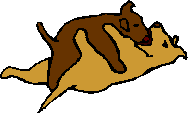What to Do
About Play Biting
All dogs bite
It starts as
puppies exploring the world with their mouths.
Puppies also bite to relieve the discomfort of
teething. Sometimes, play biting is a sign of fear
or confusion. Puppies may also bite to initiate
play. The most common and serious type of puppy
biting is fear biting. The most common type of puppy
biting is called "play solicitation" or "asking for
play by nipping."
|
The goal is not to stop all
play but to teach the pup to
bite toys, not you, and to
learn games that don't
involve play biting such
chasing a ball. |
Play is important to
healthy puppy development.
If the puppy
learns that play biting works as a way to get people
to play, then the puppy will tend to bite more. Nature insists that
young puppies play for exercise and building their
muscle, nervous system, and respiratory organs.
puppy will tend to bite more. Nature insists that
young puppies play for exercise and building their
muscle, nervous system, and respiratory organs.
The
goal is to teach the pup to bite toys not you and to
play games that don't involve play biting such chasing a ball or
Tug-of-War with rules.
Do not scold the puppy for play
biting.
Do
not respond to play biting by
scolding or in any way
physically reprimanding the pup.
This tends to make the play
biting worse as the pup seems to
think you are initiating rough
play.
The best response to play
biting is to pretend you are a
puppy. When the puppy nips or
bites you, yelp and cry like a
puppy. As soon as the puppy
backs up, count to 3 or 4, and
then praise the puppy for
stopping the biting. Then
immediately offer your hand
again for gentle mouthing.
If
the puppy licks instead of
bites, praise that. Allow the
puppy to mouth gently for the
purpose of learning how to be
gentle. As the puppy becomes
more excited and bites with more
pressure than allowed, yelp
again, as if the teeth have
mortally injured you.
The
goal is to intentionally startle
the pup and stop the play
biting Then, stop playtime and
turn your back on the puppy for
several seconds, or until the
puppy has calmed down.
Stopping
the joy of playtime is the best
reprimand for puppy play biting.
Tough love
If the puppy does not back off
when you yelp, then double or
triple the volume and the
intensity of the yelping until
the puppy seems startled. If
this fails to stop the biting,
discontinue all play and leave
the room.
Repeating this
response gives the puppy the
best chance to learn how much
pressure it takes before the
yelping starts and the play
stops. This process teaches
"bite inhibition."
The puppy
learns to inhibit the pressure
of his or her bite well below
the threshold of real pain to
people so that later, if the
adult dog is hurt, a natural
response will be to give a soft,
warning bite instead of a hard
bite.
The adult dog will
remember the puppy lesson that
people are so delicate, that
just a little pressure will make
them crumble.